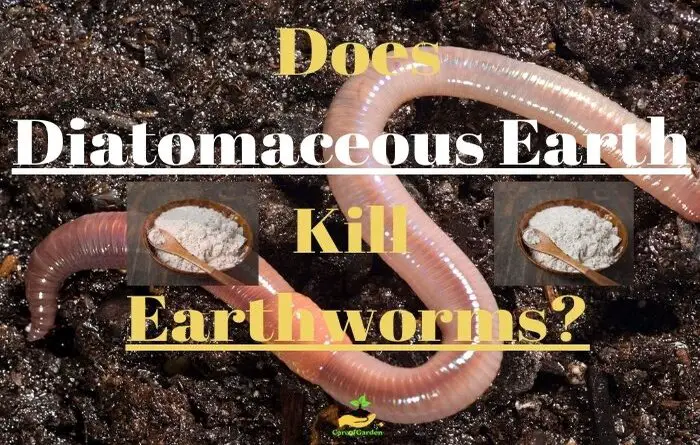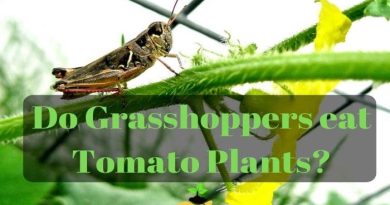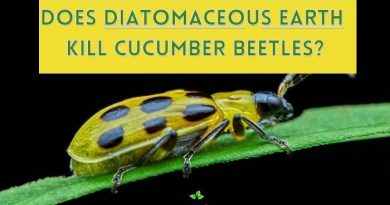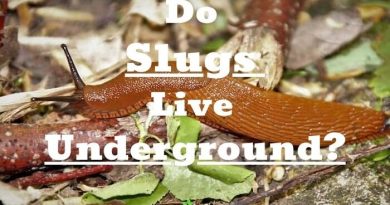Does Diatomaceous Earth kill Earthworms? [Here is the Answer]
Diatomaceous earth is a naturally occurring substance made up of the fossilized remains of diatoms, a type of algae. It is commonly used as an insecticide and pesticide due to its abrasive properties, which can cause damage to the exoskeleton of insects and other pests, leading to death. However, the question remains, does diatomaceous earth kill earthworms?
Diatomaceous earth does not kill earthworms, but it can have an impact on them. It works by desiccating the exoskeleton of insects, but earthworms don’t have an exoskeleton but a hydrostatic skeleton. While earthworms do not have an exoskeleton, they can still be impacted by diatomaceous earth if it is present in the soil at high concentrations. Studies have shown that earthworms have an ability to digest small concentrations of diatomaceous earth(DE) particles and not get harm.
Does Diatomaceous Earth kill Earthworms?
Research studies have shown mixed results on the impact of diatomaceous earth on earthworms. Some studies I read suggest that diatomaceous earth can be harmful to earthworms, causing injury or death, while others indicates that earthworms are not significantly affected by the substance.
The kind of soil, the age and health of the earthworms, and the duration of exposure are all factors that might influence the impact of diatomaceous earth on earthworms.
One advantage of diatomaceous earth for insect control is that there is no way for insects to develop resistance to it, which is not the case with many chemical insecticides. Earthworms are physically distinct from insects in that they can consume DE particles and thus diatomaceous earth will not harm them or other beneficial microorganisms in the soil.
While diatomaceous earth may have some benefits as a pest control method, it is important to weigh the potential risks and drawbacks of using the substance around earthworms.
The abrasive properties of diatomaceous earth can cause physical damage to the delicate skin of earthworms, potentially leading to death or decreased reproductive success.
Additionally, diatomaceous earth can also be harmful to other beneficial insects, such as bees and ladybugs, that are essential for pollination and pest control in gardens and agricultural settings.
Alternatives to Diatomaceous Earth for Killing Earthworm
There are several alternatives to using diatomaceous earth for killing earthworms, including:
- Salt: Salt is a natural dehydrator and can be effective in killing earthworms when applied directly to the soil. However, it is important to use salt sparingly, as it can be toxic to plants and other soil organisms.
- Neem oil: Neem oil is a natural pesticide derived from the neem tree and can be effective in killing earthworms. However, it is important to use neem oil in accordance with the manufacturer’s instructions, as it can be toxic to some plants and soil organisms if applied in excessive amounts.
- Natural predators: Encouraging natural predators, such as birds, reptiles, and amphibians, can help to control earthworm populations and promote a healthy ecosystem.
- Hot pepper: Crushed hot peppers or hot pepper extract can be added to the soil to repel earthworms. The spiciness of the hot pepper irritates the worms and discourages them from entering the soil.
Furthermore, maintaining healthy earthworm populations by effective soil management and lowering stress factors like drought and soil erosion can assist to preserve healthy earthworm populations.
How does Diatomaceous Earth work in earthworms?
One of the primary ways diatomaceous earth affects earthworms is through its abrasive qualities. The sharp, small particles of diatomaceous earth can cause physical injury to earthworms delicate skin, perhaps leading to death or reduced reproductive success.
Another factor to consider is the persistence of diatomaceous earth in the soil. Unlike chemical pesticides, which typically degrade over time, diatomaceous earth remains in the soil for an extended period, potentially affecting earthworms and other soil organisms over the long term.
I thinks it is very important to evaluate the pro and cons of using diatomaceous earth for earthworm control and that is what we will show you below!
Pros of Using Diatomaceous Earth
- Natural: Diatomaceous earth is a natural material composed of the fossilized remnants of diatoms, a kind of algae, which makes it a safer alternative to chemical pesticides because it contains no toxic chemicals.
- Wide use: Diatomaceous earth has a wide range of uses, including pest management, and can be effective against ants, bed bugs, cockroaches, fleas, spiders, ticks, and beetles.
- Long-lasting: Unlike chemical pesticides, which typically degrade over time, diatomaceous earth remains in the soil for an extended period, keeping pests away over the long term.
- Good fertilizer: Being composed of algae, it acts as an excellent fertilizer. It contains a large amount of minerals and micronutrients which can be used by plants.
Cons of Using Diatomaceous Earth
- Long-term persistence: Diatomaceous earth can persist in the environment for a long time, which can have unintended impacts on non-target organisms, including earthworms and other beneficial insects.
- Ineffectiveness against some pests: While diatomaceous earth is effective against many pests, it is not effective against all pests, and may not be the best choice for controlling certain pests.
- Ineffectiveness when wet: Diatomaceous earth is effective against pests when it is dry, but it becomes ineffective when wet. This can limit its usefulness in damp environments or during periods of high humidity.
How long does diatomaceous earth take to kill worms?
The time it takes diatomaceous earth to kill earthworms depends on various factors, including the size and type of the earthworms, the concentration of diatomaceous earth, and soil conditions.
In general, diatomaceous earth dehydrates and kills bugs fast, with most pests dying within 24 to 48 hours after exposure. Earthworms, on the other hand, are not pests and as far I have studied and researched, it can cope with this substance.
It’s also worth mentioning that diatomaceous earth, in big quantities, can indirectly have a toxic action on earthworms and other non-target species since it alters soil structure, pH levels, and nutrient availability.
What Does Diatomaceous Earth Kill?
Diatomaceous earth (DE) is often used as an insecticide and pesticide due to its abrasive properties, additionally, DE is a physical insecticide and does not contain any chemicals, making it safe for use around food and in garden areas where edible plants are grown.
Here is a table I created with the effectiveness of diatomaceous earth against different insects and pests:
| Insects/Pests | Diatomaceous Earth Effectiveness |
|---|---|
| Earthworms | Limited |
| Bed bugs | Yes |
| Cockroaches | Yes |
| Fleas | Yes |
| Ants | Yes |
| Spiders | Yes |
| Beetles(including Japanese beetles and Colorado potato beetles) | Yes |
| Ticks | Yes |
| Earwigs | Yes |
| Mites | Yes |
| Centipedes | Yes |
| Millipedes | Yes |
| Slugs* | Yes |
| Snails* | Yes |
| Mosquitoes | No |
| Flies | No |
| Ladybugs | Yes |
| Honeybees | Yes |
| Butterflies | No |
| Bumblebees | Yes |
| Tomato Worms | Yes |
| Armyworms | Yes |
| Mice | No |
| Rats | No |
Is Diatomaceous Earth safe for beneficial insects?
One of the most important benefits of using diatomaceous earth as a fertilizer is its effectiveness against pests. It dehydrates insects, killing them in the process, and it doesn’t harm beneficial insects like earthworms and pollinating insects.
Diatomaceous earth is considered safe for beneficial insects in small amounts, however it is recommended to not test it and don’t spray the flowers should be avoided.
When using diatomaceous earth, it’s important to use food grade, pure diatomaceous earth, which is safer for beneficial insects and other non-target organisms.
Additionally, it’s important to use diatomaceous earth in a way that minimizes contact with beneficial insects.
For example, avoid application during times when beneficial insects are active and avoid application directly to blooming plants where bees and other pollinators may be present.
Will diatomaceous earth kill my red wigglers?
No, diatomaceous earth doesn’t not harm red wigglers, a species of earthworm that is often utilized as composting worms. Compost worms are physically distinct from insects in that they can consume DE particles. The particles are then removed from their vermicast.
Conclusion
In conclusion, diatomaceous earth can be an effective tool for controlling pests in the garden but the effect of diatomaceous earth on earthworms may be unpredictable, depending on soil conditions, earthworm populations, and duration of exposure.
While diatomaceous earth does not necessarily kill earthworms, it can have an impact on their health and populations. Therefore, it’s essential to use diatomaceous earth with caution and to follow label instructions carefully.




